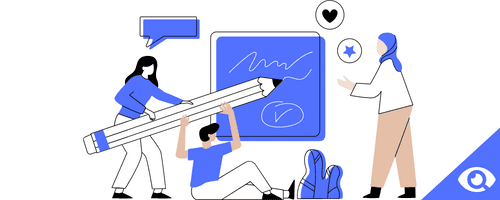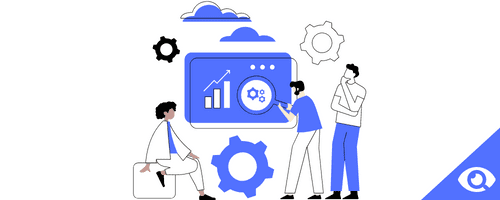Before we discuss the benefits of a CRM system, let’s define what the software is.
CRM stands for customer relationship management. In the simplest terms, it is a type of software that gathers and stores information about prospects and customers, including their history of interactions with your business.
While relationship management is its primary purpose, a CRM system can benefit your business in many ways. The advantages vary depending on the industry; however, seven CRM benefits apply to every user:
1. Better Customer Relationships
2. More Efficient Business Processes
3. Faster Customer Service
4. Targeted Marketing
5. Improved Collaboration
6. Increased Revenue
7. Analytical Data and Reporting
[Related Article: 10 Best Free CRM Software in 2022-2023]
1. Better Customer Relationships

We used to know our customers personally. We made small talk and shook their hands at the close of a deal. We knew the names of their spouses and crossed paths with them on the street. We had a window into their world—because it was our world.
For most businesses, this is a bygone era. We’ve shifted to eCommerce or grown too big to be familiar with every client. So, how can we get to know them?
Customers are still telling us about themselves, just in different ways. Whether they fill in an online survey or abandon an item in their e-cart, they are communicating who they are and how we can connect with them. Their digital fingerprints are everywhere.
A CRM collects these ‘fingerprints’ and analyzes them to understand your customers’ needs and wants. This is one of the biggest benefits of a CRM system, and it trickles down to your customers. Empowered by data, you can build stronger, mutually beneficial relationships with your clients.
2. Make Your Business More Efficient

Eighty percent of SMEs still rely on unstructured manual tools (email, spreadsheets, paper files, whiteboards, etc.) to complete routine tasks. These outdated business processes slow your business down and damage the bottom line. According to market research firm IDC, inefficiency reduces annual revenue by 20-30%.
You can update your business processes and reap major benefits with a CRM system. It can replace virtually all of your tedious manual processes with smooth and efficient workflows.
Perhaps you’ve already modernized your business but find yourself overrun with too many tech tools. To complete a task, an employee must be familiar with every tool, input the password for each one, and navigate between multiple interfaces. Having to jump through so many digital hoops can lead to ‘technology fatigue’ in users.
A CRM can maximize efficiency by integrating all your third-party applications into a single platform. Check your email, social media, sales reports, and more without having to toggle between systems.
3. Faster Customer Service

People are busier than ever, and the fastest way to turn a customer off is to waste their time. Speed doesn’t mean rushing the client. It means serving them within the timeframe they expect. Increasingly, that means offering an immediate service. 80% of businesses and 64% of consumers expect a response from customer service in real-time.
A CRM can help your business get up to speed by automating customer service tasks, such as:
- Chatbots that offer instant answers to common questions. They can also transfer more complex queries to the right staff person.
- Automated customer service is available 24/7 (without any added cost).
- Managing requests for online resources. Product guides, eBooks, white papers, and other premium content is emailed instantly.
- Automated appointment setting.
- Templates for repeat orders.
- Streamline conversations across support channels (email, chatbot, calls, social media) into a single record.
Our intuition is that automation alienates customers. However, a Zendesk survey suggests the opposite is true. 69% of consumers evaluate the quality of customer experience (CX) based on timeliness and speed. CRM gives your company a distinct advantage by responding to customers quickly.
Another benefit of CRM automation is a reduced workload for your customer service team. They can focus on more important things, like building better client relationships.
4. Targeted Marketing

Today there is no average customer. Consumers want to be seen as individuals. They expect web content, ads, promotions, and product recommendations to be tailor-made. A CRM can help you get to know your customer by tracking data such as:
- Website visits
- Product views
- Purchase history
- Returned items
- Abandoned carts
- Reviews
- Location
- Lifestyle
- Career
- Education
- Social handles
- Likes
- Email opens
A CRM doesn’t just gather customer information. It also analyzes the data, helping your business pursue the right opportunity at the right time. The customer journey becomes more personalized, and we know buyers respond to that. In fact, 72% of consumers will only engage with customized marketing messages.
A CRM can deliver the unique, individual proposition that consumers appreciate. Imagine emailing a birthday greeting to an existing customer, complete with a discount on an item they’ve recently viewed online. Your marketing pitch is personal, timely, and CRM can automate the entire thing.
5. Improved Collaboration

This is the age of hyperconnectivity. Customers and businesses can engage in more ways than ever: websites, social media, phone, text, and email. Keeping track of customer interactions across so many channels and departments is all but impossible. Yet, customers expect a seamless interaction with the company.
A key advantage of a CRM system is it creates a single system of record. Multichannel data is combined into a 360-degree view of the customer. All customer details, including their interactions with the company, can be seen from one window. Information is no longer siloed between departments and employees. All staff can look at the digital profile and find actionable insights.
There’s no redundancy. Nothing slips through the cracks. A CRM keeps the entire team working in tandem to serve the customer better.
6. Increased Revenue

According to Forbes, less than half of all sales reps meet their annual quotas. CRM can help your business become more profitable by boosting your sales team’s performance.
Higher Conversion Rates
One way a CRM increases revenue is through higher conversion rates. CRM can use customer data to segment customers and prospects. This allows sales reps to pitch the right product to the right person.
A CRM can also score leads and calculate win probability. Sales staff can focus their efforts on the hottest prospective deals.
Longer Relationships
Return customers generate up to 80% of a company’s revenue. Creating an accurate buyer persona of your best customers is the key to finding more of their kind. A CRM can sift through:
- Financial profiles
- Purchase histories
- Preferences
- Industry
- Lifestyle
- Engagement activity
- Job Seniority
- Product reviews
You end up with an accurate, nuanced profile of your most profitable customers.
Access to such granular data also helps you keep loyal customers happy. You can engage their interests and predict their needs and wants. The CRM also provides a detailed record of every client interaction. By knowing their history, you can build a stronger rapport with the customer.
Opportunity Selling
CRM collects information such as order histories and product views. It also provides salespeople with a window to where the customer is in the buyer journey. This data helps your team see where additional sales opportunities exist. For example, a sales rep may try to cross-sell items the customer recently viewed online.
7. Analytical Data and Reporting

Every modern business knows that data is an asset. No company, group, or organization says, “Forget about the data, let’s just rely on instinct.” The business world understands that without data, we’re prone to making poor decisions.
And yet, an estimated 60-73% of customer data goes unused. Just think of all the valuable insights lost to the digital ether.
One of the main benefits of a CRM system is its reporting capabilities. While other businesses let their data go to waste, CRM can translate your data into powerful insights for the entire team such as:
- Performance reports, sales trends, predictive sales analysis, and pipeline tracking for the sales department.
- Marketers can measure their campaigns’ ROI by tracking impressions, clicks, email opens, and other audience engagement metrics. Some CRMs have the advantage of linking engagement to leads and deals closed.
- A CRM benefits business execs by using the data to identify potential markets, consumer trends, gaps in the market, and other opportunities.
A CRM not only analyzes all this organizational data but it can also display it from your dashboard. With just a glance, you can see where your business stands and make effective decisions.
How You and Your Customers Can Benefit from CRM
Of all the benefits of a CRM system, using data and technology to work faster and smarter is one of the biggest. This serves your business obviously, but your customers benefit too. You have more time to focus on them. And they’re an important audience to please, as you can’t run a business without customers.
Choose the right CRM for your business today, and see your business processes improve, your revenue increase, and your customer satisfaction soar.
Not sure what you need?
Use our free guides and tools. Just fill in the forms with your requirements and get a full report and list of CRMs that could be a great fit for your business.




